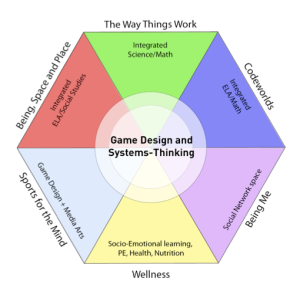Q: Which project do you like the most or which project is the most impressive? Why?
A: I think that the Quest to Learn project was incredibly impressive. The project bases all of its teaching on creating video games or other projects involving technology. project taught kids how to break down a problem into smaller, more manageable pieces. The way that children learn in Quest to Learn is similar to the way that one completes a video game. Just as you cannot move on to the next level of a video game until you have completed the previous level, the kids cannot move on to the next topic until they have mastered the previous material. I think that being able to break down the components of a problem is an important skill in the 21st century. We are presented with so much digital information every day that it is easy to become overwhelmed. I think it is crucial for kids to apply the knowledge and skills they are learning rather than just memorizing facts, and Quest to Learn allows them to do that.
Q: Do you think you need to sharpen your digital medial skills? What are some challenges for you to use the digital media in your own learning/ teaching? Maybe it’s the challenges related to resources, time management, curriculum design, your own skills, teachers’ collaboration?
A: I could definitely stand to sharpen my own digital media skills. In my own teaching, I hope to utilize technology to make learning easier. Improving my digital skills would also make my own learning much easier. Technology is very important to speech pathology, the field I hope to enter. There are many tools and apps used by speech pathologists to help people with speech produce language correctly. In school, I was taught how to use the Microsoft Office and surf the Internet, but I have not received instruction in must else besides that. In high school, the only technology I had access to at home was a flip phone and a laptop. As a student at UGA, I have access to many more forms of technology such as the materials available in the Digital Media Lab. I should sharpen my skills in order to communicate more effectively in the 21st century world.
Q: Do these projects reminds you of some ideas you learned from your reading (meaningful learning with technology chapter 1)? What are the ideas? How did you see the connections?
A: These projects remind me of the characteristics of meaningful learning that the chapter described. Since these projects are attempting to promote meaningful learning, it would only make sense that they promote learning that is active, intentional, authentic, cooperative, and constructive. I think that the Quest to Learn project was a great example of intentional learning. Students work on the projects with the intention, or ultimate goal, of completing them. As they work towards this goal, they learn, analyze, and apply the material of their learning. It seems that the ideology behind using technology in learning with these projects and the ideas discussed in the reading are different. The reading suggests that technology is a tool used to facilitate learning, but it cannot replace an instructor’s guidance. In these projects, the kids are learning mainly through technology. However, the teachers are still not completely absent from the learning experience.
Q: How do social networking sites or virtual communities broaden and/or otherwise change your students’ sense of community, and/or interaction with others? How do students communicate differently using technology than they might in person? What benefits do these digital tools offer, and what challenges might they present?
A: I think that social networking offers children who are less extroverted than some of their peers the opportunity to express their thoughts and participate in the classroom.  It is easier for some kids to express their thoughts and opinions through writing than it is to express them verbally. In the video, one teacher stated that kids who almost never spoke in the classroom were stars in the virtual communities and chat rooms he made for his class. It is exciting for students to see feedback on their posts and comment on the posts of others. It is good for children to gain exposure to online communities, since they are a prominent form of communication between people around the world in our globalized society. There are drawbacks to an increased use of social networking in the classroom. Face-to-face interactions are something we must be competent in in everyday life, and increasing the use of social media in school gives children less opportunities to practice this skill. Of course, as our world changes it is important that children can articulate themselves via social media as well.
It is easier for some kids to express their thoughts and opinions through writing than it is to express them verbally. In the video, one teacher stated that kids who almost never spoke in the classroom were stars in the virtual communities and chat rooms he made for his class. It is exciting for students to see feedback on their posts and comment on the posts of others. It is good for children to gain exposure to online communities, since they are a prominent form of communication between people around the world in our globalized society. There are drawbacks to an increased use of social networking in the classroom. Face-to-face interactions are something we must be competent in in everyday life, and increasing the use of social media in school gives children less opportunities to practice this skill. Of course, as our world changes it is important that children can articulate themselves via social media as well.
Q: Did you have similar experiences or did you know any teachers/ schools doing similar things? Describe your experiences or the teachers/ schools you know. If you don’t, try to think about one think about one digital media project that you want to do with K-12 students or your friends.
A: In middle school, I took a course called Technology Education. It was a half semester-long course. In this class, our end goal was to create a short flash animation movie. My teacher did not give us a lot of guidance, and I did not retain a lot of information from that class. Thus, I became a little bit frustrated. This class made me become frustrated with technology. The teacher gave all of our instructions verbally, and I am not a verbal learner. Thus, I thought that I wasn’t great at technology and avoided taking classes that involved a lot of technology in my high school and college courses.
Q: John Seely Brown says: “In a world of rapid change, the need to memorize something is a 20th century skill.” Do you agree or disagree with this statement? In what instances might memorization, or other more “rote” methods, still play a vital educational role? In what ways can approaches complement each other? (cited from the discussion guide for the video clip).
A; I agree with this statement to a degree. With technology, it is more convenient for people to look up complicated or obscure facts or use technology rather than taking the time to memorize it. I believe there are definitely circumstances in which rote memorization is required as a base for learning information at a higher level. For example, if you never memorize basic rules of addition and subtraction and the multiplication tables, it is time-consuming and near impossible to do calculus. I think that both approaches can definitely complement each other. For example, say that you are doing a complicated chemistry experiment. If you know basic math, which is based in memorization, you can do the math required to perform the functions of this experiment. However, you could use your tablet or iPad to read the steps of the experiments or watch Youtube videos of people performing the experiment as you go through the complicated procedure.
Image Citations
http://www.gamification.co/2011/04/07/school-is-fun-when-you-quest-to-learn/
